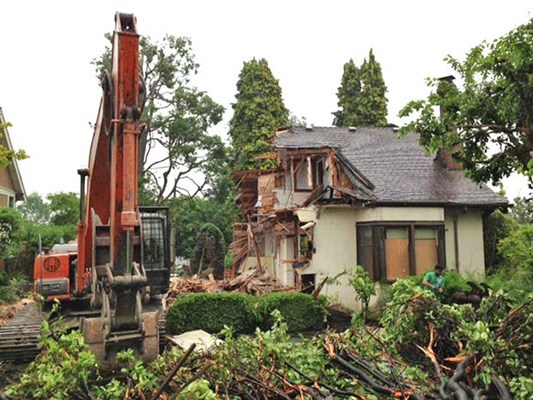Residents of the Queen's Park neighbourhood who live near 221 Third Ave. are lamenting the loss of what they say was a heritage home that should have been preserved.
Lois Wager, who lives a block away, said she is upset the small cottage built in 1926 was recently pulled down to make way for two new homes to go on the double lot.
"I'm not happy," she said. "I don't think a lot of people were aware it was going to happen. I just think they're beautiful homes and they should be left in the neighbourhood."
Another neighbour, Karen Hollick-Kenyon, agreed, suggesting it would be easier to understand the demolition if the house had been rundown.
"I know people have the right to do what they want with their lot, and it's not like I've been down at city hall fighting for it or anything, but I guess the reality - when I saw them start to take it apart - I just started to feel really sad about it," she said.
According to New Westminster city heritage planner Julie Schueck, the city did approach the owner of the house to encourage him to preserve the building, but was unsuccessful.
"This guy came in and was really keen to look at possible ways of retaining the heritage," she said. "We looked at shifting the lot line, we looked at reducing setbacks and, unfortunately, because the house (was) so wide, any kind of new or shifting of the lot line would have resulted in a really, really skinny house that basically didn't make any sense. So, we looked at every scenario possible, and reluctantly we agreed that it was just impossible."
Schueck said the house was on a large property that straddled the lot lines, which allowed for development of new homes without subdivision.
Moving the house to another site altogether also wasn't feasible because the house was so wide, she said.
While the city does have the option of placing a ban on demolition without the owner's consent, this is very rarely carried out.
If the city goes ahead with placing a protection ban on a house to keep it from being demolished, the owner has the right to sue the city within one year for compensation.
Since 1995, only one municipality in B.C. has implemented the demolition ban on a heritage building - and that did not end well for the municipality, Schueck noted.
In Victoria, Rogers' Chocolates applied to renovate the interior of its store in 2009, which would have meant removing some heritage fixtures, but the city enacted the heritage designation bylaw to prevent the company from moving forward. The company then sued the city and won the case, which meant Victoria had to pay "a whole lot of money" to Rogers', according to Schueck. The case also cast a pall on the heritage conservation efforts in the province as a whole, she said.
"That's a really, really powerful tool, and it's a very serious tool," she said. "If we were to do that, in my opinion, it would only be for a building that is very important to the entire community. So, in other words, a building that everybody knows about and everybody loves; not a lovely house on a quiet street in Queen's Park, unfortunately. We have to be very careful how we use that tool."
A proposal in the 1990s to establish the Queen's Park neighbourhood as a protected heritage area did not succeed because there was not enough support given by homeowners in the area, Schueck said. Similarly, a proposal by the city to establish four heritage conservation areas within New Westminster this spring was not met with much enthusiasm by homeowners in those areas.
In an average year, the city receives between 40 and 60 applications for demolition of properties older than 50 years. So far this year, 20 applications have been submitted, three of which were for properties in Queen's Park.
Any time New Westminster city hall receives a request for a permit to demolish a building that's older than 50 years, the city takes action to prevent the demolition from going ahead, Schueck said, though it is usually difficult to convince new owners to retract their application. "It's difficult because, as you can imagine, by the time a person submits a demo application, they've already got their mind made up, so it can be a really hard sell," she said.
However, Maureen Arvanitidis, president of the Heritage Preservation Society of New Westminster, says the city isn't doing enough to preserve heritage houses in the city.
"(It's) really super unfortunate that the city seems to not be able to show some sort of leadership in terms of coming up with some sort of protection for the area; not just for Queen's Park, but throughout the city, because that's part of what makes this New Westminster," she said.
Arvanitidis referenced the recent heritage home tour which sold more than 1,000 tickets as evidence of the general public's appreciation for heritage properties in the Royal City.
"You know, there's a huge demand and interest in heritage, but we don't seem to be highly motivated - we seem to be more interested in pointing our fingers at reasons why we can't save things," she said.



